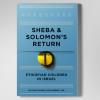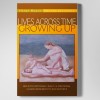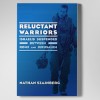12-22-05 Persimmons and Shaheebs
Yesterday was my Friday on Kibbutz. Pruning — Khoftzim — the very limbs from which we were picking — Koftzim — persimmons in the last few weeks. A lonelier day in several ways: the Bedouin family that had harvested with me have packed up, back to their Kfar; the limbs are shorn of their colors, although the leaves cling to some green; the sky is a Chicago gray, threatening or promising rain; it is colder. I, late, hail a cab, then call Moshek who brings me to join the two Thai regulars.
Later, Moshek gives me some quick demography of foreign workers and their experiences, at least on kibbutz. My best remembrance of numbers is some 200,000 workers: the Thais in fields; the Phillipinos in the homes for elderly; the Chinese, in construction. The Chinese are well-regarded as efficient, hard workers, with only occasional complaints. The Phillipinos, mostly women, leave behind family, even children for one, two years, are dedicated, quiet, shy. The Thais, well, I have told you a bit about Shai. Moshek describes trying to hire workers form former USSR, the last wave of immigrants (’90’s) many of whom (perhaps 40%) came with questionable claims to Jewish paternity or maternity and came for economic reasons; they’d prefer to be in the US, Canada, Europe. Many have built a life here (I think Moshek is being polite or kind at this moment), but life appears as misery for the men in particular. The women snap up jobs — with the elderly, kitchens and such. Hebrew is learned in these settings. The men, Moshek thinks, coming from a hierarchical setting in which their word (and fist) ruled, dismiss such “demeaning” work. They wave off the Ulpan crap, dismiss job offers they consider below them, and if they do take a job and find it unsatisfactory, bolt.
Yes, since the last wave of “Russian” immigrants, more prostitution, crime, violence and plenty of alcoholism. The irony here, I learn at the end of the day, is that Moshek’s grandparents came here from Russia in the ’30’s, helped build this kibbutz, this country. But abit more later.
Now to tree trimming. Moshek drops me off and tells me that Shay will show me how to trim only the broken branches. Later in the season, after the leaves drop, Moshek says we will do a more rigorous trimming, cut the lower hanging limbs, open the crown to more sun. Moshek only cautions, not to insert a finger in the blades (which run
an arm’s length from my pointer).
But, with a wing of a lesson, Shay leaves me with long-armed trimmers and a folding hand-saw, kind-of agricultural Mack-the-knife that hides its danger in its own belly, flipping open to attack. I watch Shay a bit to extend my one-minute tutorial, noticing that he is slaying many branches, most of which are not broken, still have green leaves.
I follow suit, but without as much vigor. Shay’s co-partner in crime follows, bears a chain saw, felling major offenders, the felonious limbs, as we move before him, concentrating on misdemeanors.
I am brought to mind of when I was perhaps four and felt, more than thought, that objects, my toys and the dining room table (recently bought, of heavy blondish wood, lathed legs) had feelings: a bump was felt, certainly a dent was remembered and stood accusingly before you on future visits. There was also a kinder side to my belief: my sister’s baby doll, which she left at home when she began kindergarten (as she left me), I would play daddy with, and kiss goodbye before I left for work, certain that dolly would appreciate this. This dolly was particularly special, as my older sister, Ester, got it as a “gift” from the furniture when my parents bought their first new bedroom set, which lived in our living room.
All this mug-about to say that as I trim limbs, I have a brief pang that these trees will feel the pain of my trimming. Then remind myself if we were more like trees, more starfishy, we could regenerate ourselves if we were shorn of the broken parts of ourselves, or the memories that block sun from reaching the remainders of our souls.
Despite such ruminations, I trim. Learn to step back periodically, like my fine barber, Moshe, at the King David, check the overall crown of my client. I learn today that I have 8,000 clients, 8,000 persimmon trees, waiting patiently, not moving from their spots, although the rising winds rustle their leaves, hint at impatience at my novitiate status among tree-trimmers. And Shay’s co-shearer closing up the rear with chain saw burps.
The low-hangers I get. Some of the wild sprouts, soaring straight to the sky as if trying to escape the bounds of earth, I am puzzled about. To trim or not to trim, is a question. I do a check over my shoulder and gather that Shay is arbitrary about this. I figure, maybe I should take down a few of these locks, so that they will not, like Absolam’s hair, in their wildness defeat the roots of their paternity, steal from their brethren below. My right shoulder has the remains of
my rotator cuff injury — superspinatus, of the four muscles, comes into my mind — picture it flowing off the scapular spine, towards the acromium, I think, maybe the coracoid process. Whichever, its twinges of pain remind me to limit my reach. I begin to catch some of these guys closer to their bases. I get a trick to protect the superspinatus, yet fell these reachers: I pin my elbow to my side, as if in a stitch, then muscle the shears with my left arm.
The trees lose some of their wild look as these sky-reachers are taken down. But I leave some. I leave some reaching to the sky, or welcoming it. My picking was thinking of this year. My trimming is thinking of next year. I think, “When Iran sends its Shaheeb missiles to Israel, they will be greeted by well-trimmed, high reaching persimmon trees in Herzilya.” Persimmon sprouts fending off Shaheebs.
The wind continues to rise and drizzles form. Shay and buddy take lunch break at 10:30. I, sniffing longed-for rain, muster on. Shay calls me over for a present: a package of eight, perfectly formed, unblemished persimmons, now treated and edible. I have them before me on my desk as I write. A small custom-shaped case, orangey-pink in background, persimmon on each face, “signed,” “Didan,” Sharon Fruit, the Sweetest Persimmon, Class 1″ to which I can attest. On its bottom, leftwards, you will find recipes for cream smoothy, fruit salad, and fruit salad (this one with celery, almonds and lemon juice). On the right is stated that new research from the Journal of Agricultural and Food Chemistry” of the USA statest hat persimmons “…are the most effective fruit preventing heart attacks and reduces
the risk of heart diseases.” Below this are the numbers: energy, fiber, Vitamins A and C, calcium, Magnesium and carbohydrate. All these my trees have developed for you.
I am touched by the gift. Notice that Shay has a hand-woven, dark brown small circular basket, smaller than the old sewing baskets, in which he carries his lunch. I spy egg shells littered where he once sat. He has his last cigarette, an inexpensive off-brand, crushes the pack and drops it to the ground. Moshek arrives latter with a liter of Coke and a new pack of smokes.
Now, Moshek notices that Shay and cohort are whacking off living branches, those with fully green leaves, not only the broken, those fractured. He chats with them; their impoverished Hebrew transmits to him that we have 8,000 trees, not enough help and must trim before the avocado harvest: can’t wait for the leaves to turn, to drop. This quietly distresses Moshek. He sails close the wind of nature, prefers to tack tightly to nature’s agenda; he is of the earth, the wind, the seasons. Explains to me, with some sadness the reasoning. Teaches me.
The leaves have precious chlorophyl, xanthophyl and carotene. After the fruit are picked, after the season begins to turn, the chlorophyl, xanthophyl are resorbed. (He is motioning along the length of a leave, towards its stem, still grasping to life on the branch.) When the carotene remains we see the beauty of the moments before death, before the leaves fall, as we admire in Washington State. Then, only then, should we pare the limbs. But Shay argues that we don’t have the leisure, the manpower to wait; also with the chain saw, they are clearing the tree’s crown to admit more sun to the interior. Moshek shrugs. Lesson taught, he will return for coffee in half and hour.
We feel the misting drizzle crescendo. We finish.
Lunch is listening time for me. We are in the chadar ochel, where Moshek seems comfortable. He talks about the detumescence of the kibbutz in the past two decades. He recalls when the chadar ochel was run by a small core of kibbutz members, with all members volunteering to fill in. He, finishing the army in the late ’50’s, began as a “waiter” here. In the last two decades, people found excuses for not doing their shifts; ended up hiring an outside food processing firm to run the place. Anyhow, about 150 people come for meals, mostly those from outside the kibbutz, especially those who work in the firms that rent office son kibbutz; DHL, an architect and such. A few elderly
characters form kibbutz sit nearby; one chewing openmouthed, chicken spilling out as he describes arriving from Hungary in the early ’30’s, just in time to catch malaria in Hadera. (I had visited the tiny hovels in Hadera where early immigrants lived; two families splitting a room, divided by a curtain.)
I notice that the other ‘white meat” ain’t around. The ubiquitous tray of pork or such that I thought they would put out at each meal as an ideological statement, has perhaps been retired. Just to be sure, when I ask for the “Chinese” chicken, I ask about the identity of the curled, sesame-crusted white strips of meat in the gemisch.
Marx, Moshek reminds me, says that ideology comes from circumstances. Moshek cites this to suggest that the ideology of the kibbutz early on, came from practical circumstances: surrounded by active enemies, night raids, pot shots, the kibbutzniks had to stay together to survive. His father once explained this as such: he picked up a stick, broke it easily with two hands. Then picked up a bundle and could not fracture them across his knee. Stick together, strong together.
But, Moshek continues, circumstances changed. People began to look around, how others were getting enriched. “I, I do not have a house, a car. Everything belongs to the kibbutz,” he says uncomplainingly. Also, kibbutz members began to resent how some worked very hard, others — not hard at all, even if at all. Why, the hard workers asked, should I bust my buns (my words, not his) to support so-and-so and his family? Perhaps human nature doesn’t tolerate socialism. Also, Moshek began, there was the international failure of socialist regimes. Then he corrects himself, as it is not possible to compare the highly democratic organism of socialist kibbutz with the totalitarian regimes who posed themselves as socialist or communist. Nevertheless, he recalls Golda Meir’s lament when Israel and its kibbutzim were not invited to the international Socialist convention sometime in the ’60’s.
Then, as if to correct, if not deny his citation of Marx, Moshek begins to talk about Amuna and Aimun, “belief” and “confidence”. Irony here, I think, as belief, Amuna, is such a religious term. But he continues. These words are so connected, same root: Amen (I will believe.). Without Amuna, Moshek finds it difficult to have Aimun, confidence in one’s way of life. (Here, ideology, in a deeply felt way, seems to precede the material.)
We talk about the religious Zionists. I describe my experiences in Kfar Etzion, a religious Zionist kibbutz, its modesty, its modest means. I tell him as they discuss adding homes, they agree not to build McMansions; they want to attract others who prefer to live modestly, despite their means. When I tell Moshek that the current homes are very modest in size, he guesses (I think remarkably accurately) that a three bedroom is about 80-90m meters (about 800-900 sq. feet). He gets Tzni’ut, a life of modesty. He even eats modestly, forgoing lunch today, preferring a cup of the watery drink that passes as grapefruit juice.
He confesses that he envies the belief and confidence that I describe and that he sees amongst the religious Zionists. But he adds, that their love of the earth (he motions now with his hands over the table), overrides their concerns for our neighbors, will dig us deep into the earth. (Here, a thumbprint as if boring into the table.). When I tell him of the range of beliefs on Kfar Etzion — from Chanan Porat (about whom he knows), who expects the Palestinians to let him
be and he will ignore them, to Myron or Eliaz (the latter a believer that the sons of Abraham can live peacefully together, who still yearns for his Arabic teacher in grade school, still is moved by the muezzin’s call for prayer, which creeps into Eliaz’s poems), Moshek is surprised. Pleasantly. But he returns to thumb and table top: such beliefs will dig us deeply into the ground.
I am off. To T.A. for the Israeli Philharmonic. I have forgotten the program, but learn later it is Dohnani (born in Germany, conductor of the Cleveland Symphony, I think) and a wonderful Beethoven Emperor played by a 21 year old Israeli (Giltberg), followed by a Tzaikowsky Pathetique, so moving,that for the first time in my life (and to my
embarrassment), I burst into applause at the end of the penultimate movement. (And much of the audience joins me, which both embarrasses me further and relieves me of being found out. Sometimes, as Leonard Bernstein said, music simply hits straight to the heart. More later.
Copyright N. Szajnberg 2005



